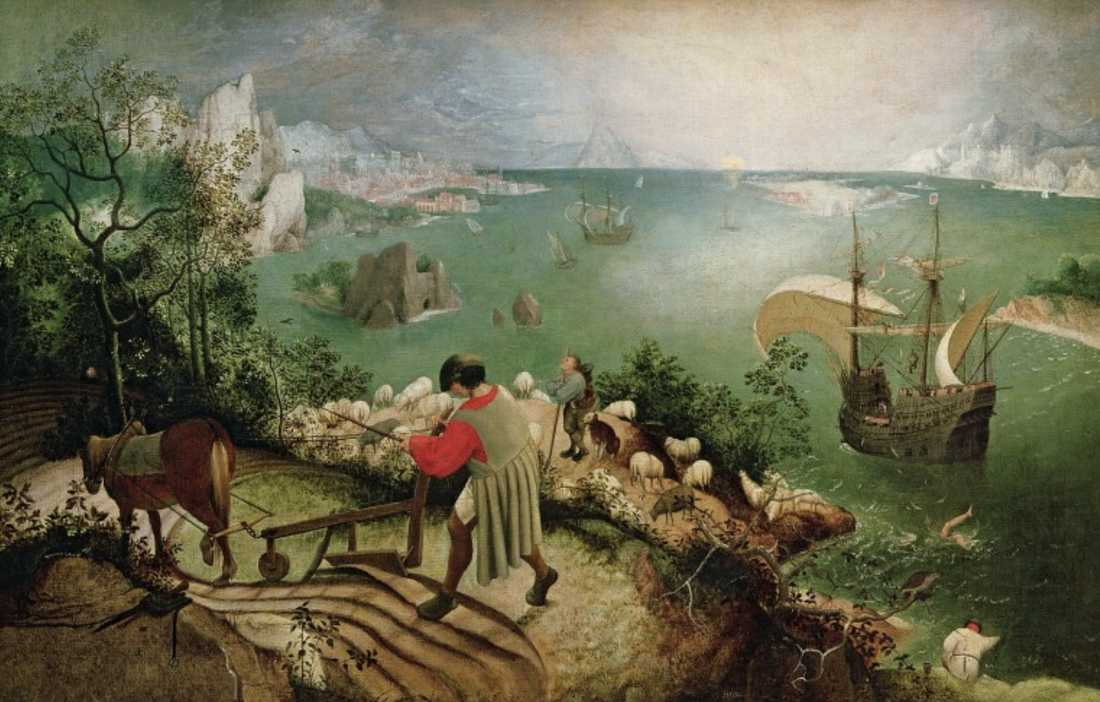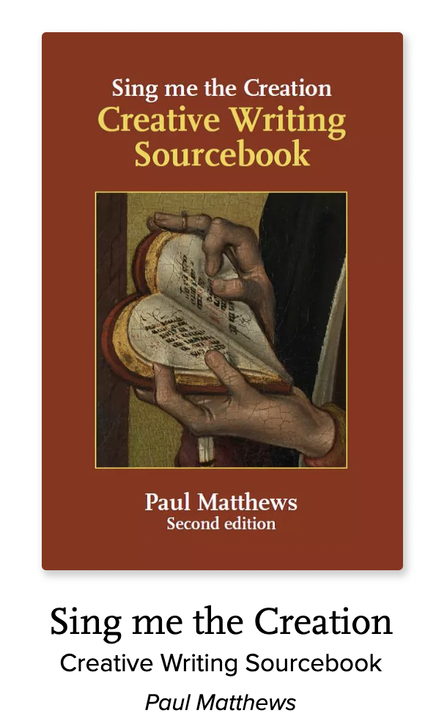Landscape with the Fall of Icarus “Landscape with the Fall of Icarus” by Pieter Brueghel in 1558. Oil on canvas, 73.5×112 cm, Royal Museum of Fine Arts, Brussels, Belgium. Pieter Brueghel, the painter of this painting, initially gained popularity as a landscape painter, but later painted the high humanism of naive peasants from a social critical point of view. Icarus, who appears in the work, is a figure from Greek mythology. The son of the architect and inventor Daedalus, while escaping from the labyrinth with wings made by his father, he ignores the warning not to go close to the sun, and as the wax with which he attached his wings melts, he falls into the Aegean Sea and dies. The theme of the work is the indifference of everyone who did not notice the fall rather than the fall of Icarus. The first thing that catches the eye is that the workers are concentrating on their own work. In the foremost part of the screen, there is a farmer plowing the field with a horse, and in the back, a person tending sheep accompanied by a dog can be seen. At the bottom right of the screen, you can see a person fishing or a monk, and the boat floating on the coast looks like a fishing boat or a cruise ship catching fish. A few fishing boats are floating in the far sea, and you can see the scenery of the city beyond them. In the lower right corner of the screen, between a large fishing boat and a fisherman, you can see two legs that someone is drowning in, and countless feathers flying around them. What is the identity of this person who flutters one arm and two legs glimpsed above the waves? He made wings of bird feathers and wax and ascended to the sky, but fell too close to the sun, causing the wax to melt and fall into the sea. Icarus is a mythical figure who succeeded in flying but forgot his limits and tried to climb higher, but lost his wings and fell into the sea to his death. While other painters have tried to teach the lesson that foolish behavior ultimately ruins oneself by depicting the falling Icarus, Bruegel's unusual focus is on how the world reacts to his tragedy. Someone has fallen into the water, but none of the people in the picture are interested. He's just preoccupied with his own business. It is a painting that satirizes the social situation that is indifferent to the pain or death of others. Or it may be a religious lesson not to harbor vain ambitions. Sometimes it just becomes a story in mythology. But from an artist's point of view, this seems to be the life of an artist. Artists complete their artistic world, rise to the stage, and create works with artistic philosophies as messages. There are many painters who live and die for the sake of art just to reach this level all their lives without any cost. They paint beautiful pictures every day, just as Icarus wants to fly with his feathers on his body. And art soars high toward the sun. However, art is a world of passion that is too hot for artists who have desires and sometimes struggle to achieve art more seriously. If they try to endure the heat of the sun and get closer, the world of art they created will burn up. In this irony, artists are destined to pursue art like sunflowers that cannot live unless they face the sun. Some artists will succeed without disappearing in the scorching sun, but no one knows whether this is also true artistic success or a by-product of another desire. Like Bruegel's painting, no one is interested in that world. Everyone plows the fields, raises sheep, travels, and prays like the characters in his paintings. Icarus was the only person who dreamed of doing something unrelated to his livelihood. The world mourns or pays no attention to a person who has such a dream because he loses his feathers and falls. Everyone will think so. You would plow the fields like me, you would raise sheep like me, you would have been saved if you prayed like me... In a world that is indifferent to the dreams of others, did Icarus really have no sense of presence like the two legs seen above the water? However, I was able to read another message of salvation in art through Bruegel's artistic sense that expressed the most tragic moments most beautifully. Even if artists lose their dreams, fall, go the other way, or sometimes give up, art is always together as beautifully as the nature around us. It's like Brueghel's beautiful landscape painting. Paul Matthews is a poet and creative writing teacher at Emerson College in Forest Row. He is the founder of Poetry OtherWise, a summer gathering for writers at Emerson College. He taught writing step by step, dividing it into statements, questions, exclamations, and command. This is especially effective for viewing pictures and writing related creative writing. Like a turquoise-colored emerald jewel, the beautiful sea makes calm waves and quietly sends ships from far away. In the distance, cottage-like houses with red roofs, like the resort town of Pale Blue, are visible toward the coastline. Another island the ships have arrived at is the tallest, a farmer in a red shirt plowing his field, concentrating on his work. It's a terraced field, so the outside is a cliff. The farmer plows the field more and more carefully, looking at the bottom. On the lower stairs, a shepherd is looking at the sky. As if something surprised him, where did something happen... He doesn't even know that the sheep he cares for go towards the sea, and he watches them endlessly. He must have seen something shocking enough to make him forget his duty. A large boat stands near the shepherd. People are not visible above the ship. Are they afraid of something? Under the boat, you can see two legs falling into the sea. Countless feathers are flying around. What the hell happened? Only the monk calls something with one hand raised while looking at the sea.
Fallen one, where did you fall from? Why did you dream? If you hadn't dreamed, there would have been no fall. Farmer in a red shirt, did you not see the feathers falling on your head? Your horse also turned away, looking at the feathers. Why did you step on it when you saw it? Shepherd! You must know what happened. You are an eyewitness to this. But you only wonder why it happened. The person dying from it is right behind you, right next to you. Can you be an eyewitness to this day? Monk! Only you will cry for him, But why not jump in and save him? Why don't you ask for help? Do you think it is natural that he is missing? Is it a sin to live with dreams? Do you believe you can tell the difference between dreams and ambition? Poor dreamer! Are you familiar with the phrase 'Life goes on'? Even if you disappear, the world goes well. What did you give yourself all to achieve? Poor artist! I want to call you like this Even if the world does not attach meaning to our art, may you spread your wings and fly again. Even if you fall hundreds or tens of thousands of times, the wings you sow will cover the world beautifully. Fly up again And show your passion again. Like a shepherd, the world will see me where I want to fly, even once. I will leave your mark on the farmer's field. Sometimes I can mourn you like a monk. All the artists in the world, even if we fall again, lets fly today like Brueghel's Icarus!!
0 Comments
Leave a Reply. |
Myungja Anna KohArtist Categories
All
Archives
July 2024
|
Proudly powered by Weebly



 RSS Feed
RSS Feed